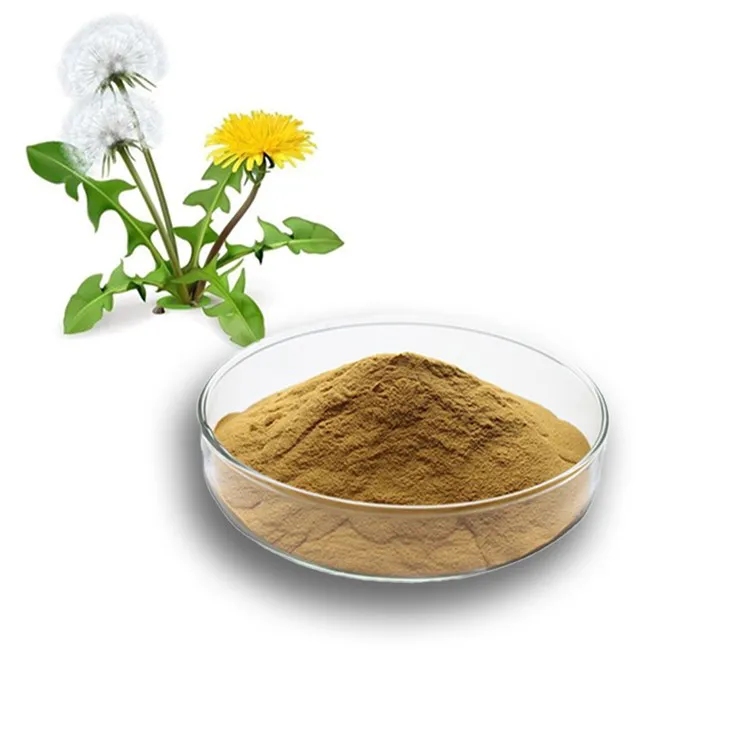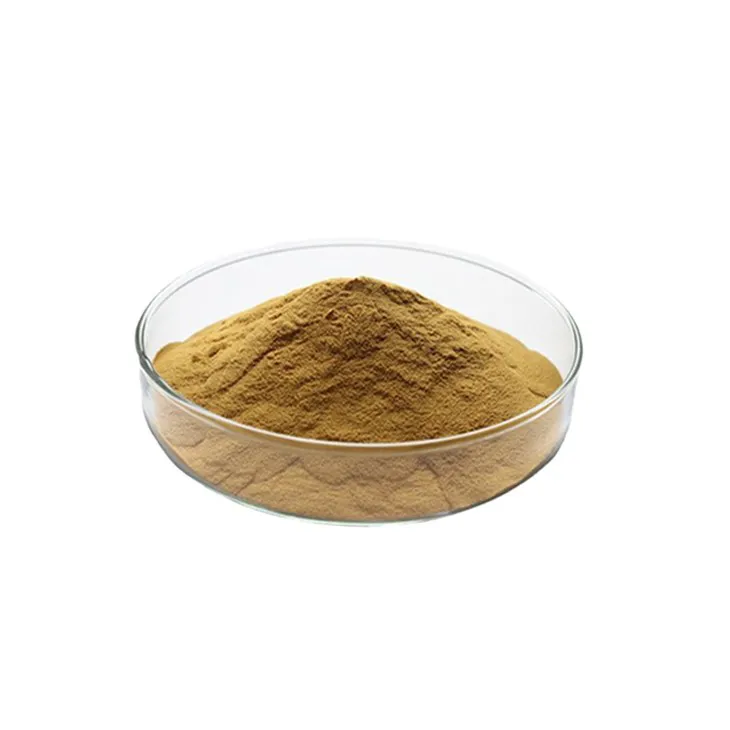- 0086-571-85302990
- sales@greenskybio.com
Organic Non - GMO Dandelion Leaf Extract
2024-11-30

1. Introduction to Dandelion Leaf Extract
The organic non - transgenic Dandelion Leaf Extract is emerging as a powerful natural resource in various industries. Dandelion, a common plant that has long been part of traditional herbal knowledge around the world, is now being re - examined for its numerous potential benefits.

2. What Does Organic Non - GMO Mean?
The term "organic non - transgenic" is of great significance when it comes to Dandelion Leaf Extract. Organic implies that the dandelions are grown without the use of synthetic pesticides and fertilizers. This not only ensures the purity of the extract but also has positive implications for the environment and human health. Non - transgenic, on the other hand, means that the dandelions have not been genetically modified. This is important as many consumers are increasingly concerned about the potential risks associated with genetically modified organisms (GMOs).

3. Applications in the Cosmetic Industry
3.1 Moisturizing Effects
In the cosmetic industry, the dandelion leaf extract is being explored for its moisturizing effects on the skin. The bioactive compounds present in the extract can help to hydrate the skin, leaving it feeling soft and supple. This makes it a potentially valuable ingredient in skincare products such as creams, lotions, and serums.
3.2 Soothing Properties
Another important aspect of the dandelion leaf extract in cosmetics is its soothing effects. It can help to calm irritated skin, reducing redness and inflammation. This is especially beneficial for those with sensitive skin types.
3.3 Hair Care Potential
The dandelion leaf extract is also considered a potential ingredient in hair care products. It is believed to have the ability to strengthen hair follicles, which can lead to healthier and stronger hair. This could be a game - changer in the hair care industry, as many people are constantly looking for natural solutions to improve the condition of their hair.

4. Nutritional Benefits and Dietary Supplements
From a nutritional perspective, the dandelion leaf extract can be a great addition to dietary supplements. It contains a variety of bioactive compounds that offer potential health benefits. For example, it may contain antioxidants that can help to protect the body against free radical damage. Additionally, it could potentially support digestive health, as dandelion has been traditionally used in herbal medicine for this purpose.
Some of the key nutrients and compounds found in dandelion leaf extract include vitamins (such as vitamin A, C, and K), minerals (such as potassium and iron), and various phytochemicals. These components work together to provide a range of potential health benefits.

5. Environmental Significance
The cultivation of organic dandelions for this extract can contribute to biodiversity. Dandelions are often beneficial for pollinators, such as bees and butterflies. By growing dandelions organically, we are not only providing a source of valuable extract but also creating a habitat and food source for these important pollinators.
In addition, the use of organic farming methods for dandelion cultivation reduces the impact on the environment compared to conventional farming. Since no synthetic pesticides and fertilizers are used, there is less pollution of the soil, water, and air. This helps to maintain a healthy and sustainable ecosystem.
6. Challenges and Future Prospects
6.1 Challenges in Cultivation
Despite its potential, there are some challenges in the cultivation of organic non - GMO dandelions for extract production. One of the main challenges is ensuring consistent quality. Since dandelions are wild plants, their growth can be affected by various environmental factors. This can make it difficult to produce a consistent and high - quality extract.
Another challenge is the scale of production. Currently, the production of dandelion leaf extract is relatively small - scale compared to other more common plant extracts. Scaling up production while maintaining the organic and non - GMO standards can be a complex task.
6.2 Future Prospects
Looking ahead, the future prospects for organic non - GMO dandelion leaf extract are promising. As consumer demand for natural and sustainable products continues to grow, there is likely to be an increased interest in this extract. Research is also ongoing to further explore its potential benefits and applications, which could lead to new product developments in the cosmetic, nutritional, and other industries.
Furthermore, with the increasing focus on environmental protection and biodiversity, the cultivation of organic dandelions could become more widespread. This would not only benefit the production of the extract but also have a positive impact on the overall ecosystem.
7. Conclusion
In conclusion, the organic non - GMO dandelion leaf extract represents not only a product with potential health and commercial applications but also one that can play a positive role in ecological balance. Its use in the cosmetic industry for skin and hair care, its potential as a dietary supplement, and its environmental benefits all make it a valuable natural resource. While there are challenges in its cultivation and production, the future looks bright for this emerging natural extract.
FAQ:
What are the benefits of organic non - GMO dandelion leaf extract in cosmetics?
Organic non - GMO dandelion leaf extract is being explored for its moisturizing and soothing effects on the skin in the cosmetic industry. It is also considered a potential ingredient in hair care products because it may have the ability to strengthen hair follicles.
Why is the organic non - transgenic" label important for dandelion leaf extract?
The "organic non - transgenic" label is important because it indicates that the dandelions are grown without synthetic pesticides and fertilizers and without genetic modification. This makes the extract a more natural and potentially healthier option.
What bioactive compounds does dandelion leaf extract contain?
Dandelion leaf extract contains bioactive compounds which make it a great addition to dietary supplements from a nutritional perspective. However, the specific bioactive compounds can vary, and further research is often needed to fully understand their composition and effects.
How can the cultivation of organic dandelions for this extract contribute to biodiversity?
The cultivation of organic dandelions for this extract can contribute to biodiversity as dandelions are often beneficial for pollinators. By growing dandelions organically, we are supporting the natural ecosystem and the organisms that depend on dandelions, such as bees and other pollinators.
What are the potential health applications of organic non - GMO dandelion leaf extract?
Potential health applications of the extract include its use in dietary supplements due to the presence of bioactive compounds. In addition, its possible effects on skin (moisturizing and soothing) and hair (strengthening hair follicles) also suggest potential health - related benefits, although more research is required to confirm these effects.
Related literature
- "The Potential of Dandelion (Taraxacum officinale) in Health and Cosmetics"
- "Organic Extracts: Dandelion Leaf and its Bioactive Components"
- "Dandelion Leaf Extract: A Natural Resource for Ecological and Health Benefits"
- ▶ Hesperidin
- ▶ citrus bioflavonoids
- ▶ plant extract
- ▶ lycopene
- ▶ Diosmin
- ▶ Grape seed extract
- ▶ Sea buckthorn Juice Powder
- ▶ Beetroot powder
- ▶ Hops Extract
- ▶ Artichoke Extract
- ▶ Reishi mushroom extract
- ▶ Astaxanthin
- ▶ Green Tea Extract
- ▶ Curcumin Extract
- ▶ Horse Chestnut Extract
- ▶ Other Problems
- ▶ Boswellia Serrata Extract
- ▶ Resveratrol Extract
- ▶ Marigold Extract
- ▶ Grape Leaf Extract
- ▶ blog3
- ▶ blog4
-
Chinese Nettle Root Extract Powder Factory.
2024-11-30
-
Organic Yellow Pine Extract Powder Supplier
2024-11-30
-
Standard - process Hesperidin.
2024-11-30
-
Almond Extract Powder
2024-11-30
-
Avocado Extract Powder
2024-11-30
-
Lotus leaf extract
2024-11-30
-
Hawthorn powder
2024-11-30
-
American Ginseng Root Extract
2024-11-30
-
Gynostemma pentaphyllum extract
2024-11-30
-
Bilberry Extract
2024-11-30
-
Clove Powder
2024-11-30
-
Mulberry Extract
2024-11-30
-
Europen Bilberry Extract
2024-11-30





















